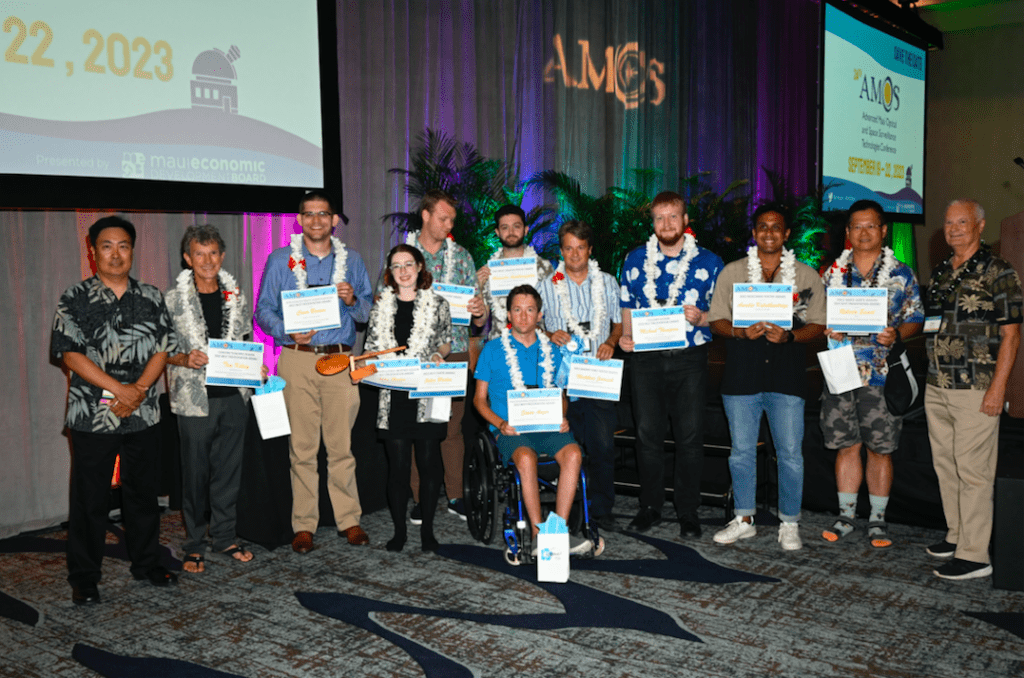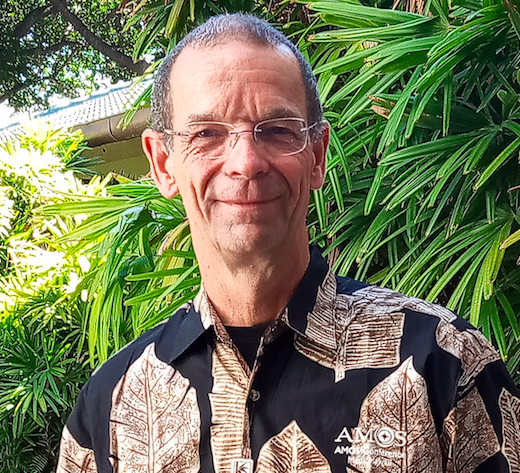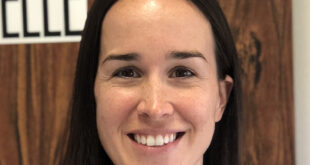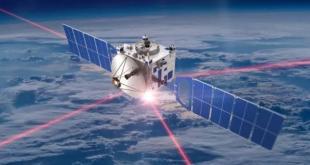By Valentin Eder

This year the 23rd AMOS (Advanced Maui Optical and Space Surveillance Technologies) Conference, held in Hawaii from the 27th to the 30th of September 2022, hosted 1212 in-person attendees at the Wailea Beach Resort and 259 guests virtually. The conference sold-out way in advance. Maybe a sign of a post-Covid desire to travel, or maybe a sign that Hawaii never loses its exotic allure, nevertheless the enthusiastic attendance also reflected a growing interest in space sustainability and space commerce initiatives across all sectors, from national governments to private companies, from non-governmental entities to the science community.
Free the data
In the conference opening address Lieutenant General Michael A. Guetlein, the first commander of the Space Systems Command (SSC) laid out several statements, some expected and some others, at least from the European point of view, less so. For example, he said that “[…] capacity alone is not going to get us to where we got to get to, we’ve got to free the data. We have put so many constraints on the data, so many rules on what you can look at what you can’t look at it, what have you, we’ve got to free the data.”
This statement, especially because it’s coming from the Commander of the SSC, brings a new perspective to satellite operations and the responsibilities of satellite operators. The statement is in line with the one from Maj. Gen. Michael Traut (German Space Force) made at the PSSI conference in Prague, declared that ‘the fifty shades of classification has to come to an end. If space surveillance data are available for free, new applications can be built upon such data, and this could impact this field as it impacted the Earth Observation sector. To make an example, the downstream market exploded when it became possible to combine infrared and visible data and transform them into applications for agriculture. If space surveillance data are available for free, new applications can be built upon such data, and this could impact this field as it impacted the Earth Observation sector.
The second keynote address came from Ezinne Uzo-Okoro (Assistant Director for Space Policy White House Office of Science and Technology Policy). She declared that “The DoD will rely on the findings and recommendations from efforts like the spacecraft anomalies and failures were workshops to build out this framework. And crowdsourcing anomaly data poses challenges to commercial companies. So, we expect that safety data will be the first thing we do in the first step in sharing.” In this statement, she confirms to agree with Guetlein regarding free data sharing to allow cross-correlations and build a more comprehensive picture for the space community. Importantly, this new policy might also change how we deal with spacecraft anomalies as a non-classified topic – regardless of the financial impact on the stock exchange values of space operators.
Supervision of operations
Another meaningful statement came from Diane Howard, Director, Commercial Space Policy at the National Space Council, who explained the US effort in formulating new future frameworks and rules and the intention of the States to invite allies in participating in such an effort. In her invited speech, Howard said that “[…] what I’d like you to start thinking about supervision [is] what are some ways to provide meaningful supervision of the operational phase of missions, supervision that doesn’t burden business models, and doesn’t hinder innovation?”.
If space surveillance data are available for free, new applications can be built upon such data, and this could impact this field as it impacted the Earth Observation sector.
The intentions behind this approach seem clear: allow growth for the business and innovation industry in the upstream, downstream, and midstream markets, but add rules and regulations. This should not be too hard: speed limits do not limit business and innovation and they even encouraged the development of new tools, such as cruise control. However, this raises a question: within this frame of business stimulation, which type of innovations will be prioritized? Will the government prioritize environmentally friendly innovations supporting orbital sustainability, such as open data exchange platforms, or will keep supporting unsustainable solutions (like satellites without propulsion)?
Howard, in her talk, introduced the concept of “meaningful supervision of the operational phase of missions”, but it’s not clear what she was referring to. Who or what should be supervised? Does this mean a kind of regulatory body or administration body supervising all the operations? Or only some kind of operation? At the end of the day, the only behavior that can be sanctioned is the behavior of the space operator. This again requires a definition of what sustainable behavior is, and what can be monitored daily without the support of the operators. Again, if we want to compare orbital management to road traffic management, this is equal to thinking that the speed limit controls have to work without the interactivity of the car driver.
The OADR and the search for data commercialization
Richard DalBello (Director, Office of Space Commerce) also intervened, explaining the role and the goal of the Office of Space commerce legally residing at NOOA and responsible for the coordination of space-related issues, programs, and initiatives within the Department of Commerce. Its goal should not be just a copy and paste of the US Department of Defense but instead ‘…have a goal of trying to take advantage […] of new technologies that exist, many of those commercial technologies and young companies.‘ …. and… ‘And I think the central message that we’re getting from the commercial sector is [that] if all you’re going to do is give us what we were already getting from the Defense Department, we think that’s not enough.’
Will the government prioritize environmentally friendly innovations supporting orbital sustainability, such as open data exchange platforms, or will keep supporting unsustainable solutions (like satellites without propulsion)?
It would be interesting to understand what the Office of Space Commerce is trying to achieve. Already with the initiative of the Open Architecture Data Repository (OADR), it seems that the Office of Space Commerce has the vision and plan to generate services based on the DoD data under the supervision and control of the US. The applications of the OADR should be hosted and checked/validated by the OADR infrastructure itself, and it should offer free and commercial products. DalBello concluded with ‘[…] we do want to provide a forward-leaning technical, technologically superior product to what they’re receiving today.’
Does that mean that the Office of Space Commerce would like also to act as a sort of technology broker for the US government services? For the time being, the terms and conditions of the OADR ‘membership’ or software hosting are not known. The OADR is at the moment in a pilot phase and it might go online soon. An interesting side is that the Office of Space Commerce is open to international participation. This means that the OADR is not restricted to US companies only.
LEO Constellations
DalBello also mentioned that “[…] we clearly need to develop new technologies and do new operational approaches for maximizing below earth orbit. […] I have to assume that we’re going to have dozens of constellations operating in the future. And we need to have a plan for dealing with that.”
This statement gives a hint of the US concerns’ regarding how to deal with the upcoming challenges of the commercial space sector and the need for the government of securing its services. It seems that the US is taking the approach seriously.
In conclusion, in the context of the AMOS conference, the political statements from the several high-ranking speakers participating in the meeting showed a strong interest of the US in moving from the present un-regulated commercial space operations approach to a rule-based system taking into account the responsibilities of the commercial space operators. The conference also showed the interest of the US to work together with Europe (possibly at the same level) to establish such space regulations. Time will show if the European Commission will take this opportunity and initiate the discussion with the US side to join forces.

Valentin Eder has a background in industrial engineering, high-voltage power grid management, spectrum monitoring, robotics, software (Data management and Big Data applications), systems engineering, and space environment management. He holds a degree from the University of Salzburg in Geographical Information Systems. He is the founder and CEO of Space Analyses Vienna seeking a holistic convergence of Big Data with the Space-Time Continuum and applying the results to domains such as Satellite Communication and Space Debris Management.
 SpaceWatch.Global An independent perspective on space
SpaceWatch.Global An independent perspective on space




